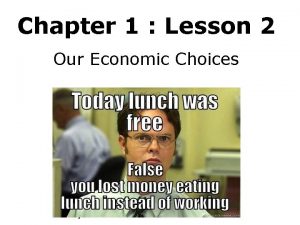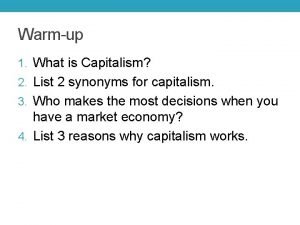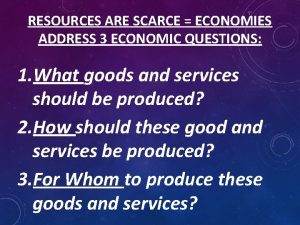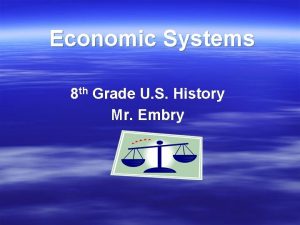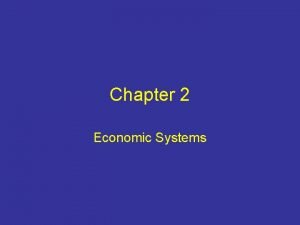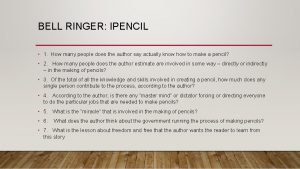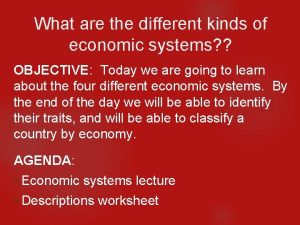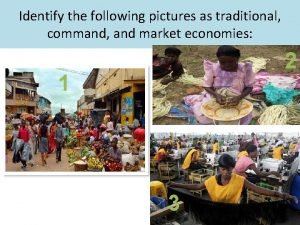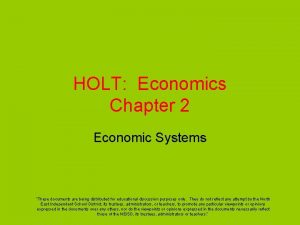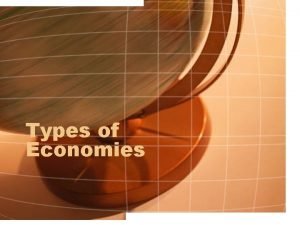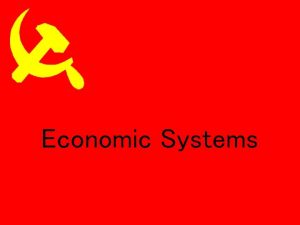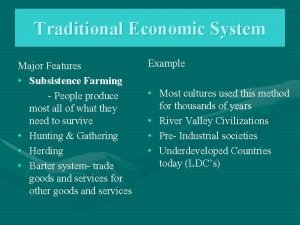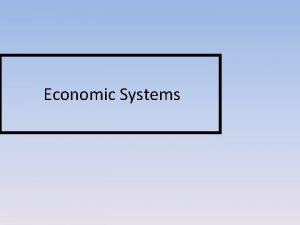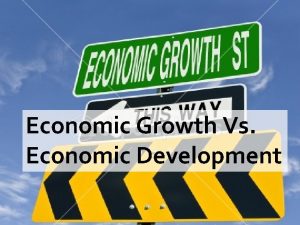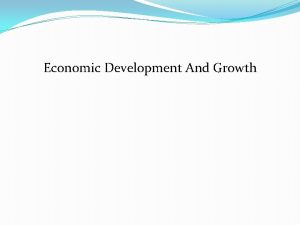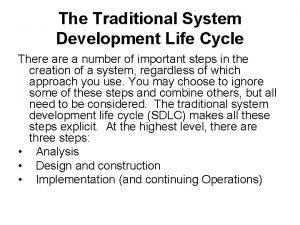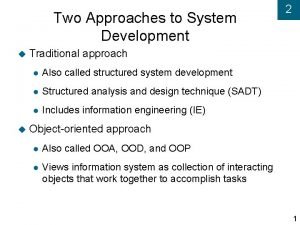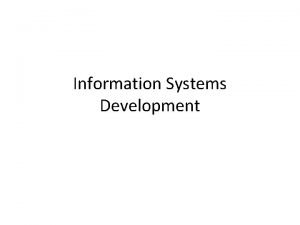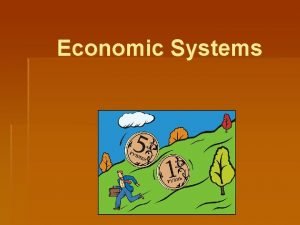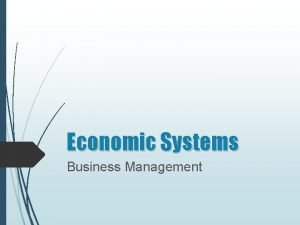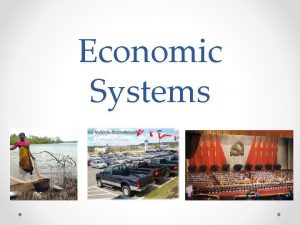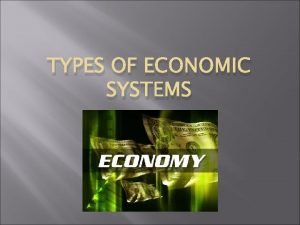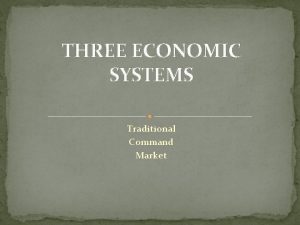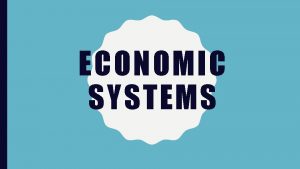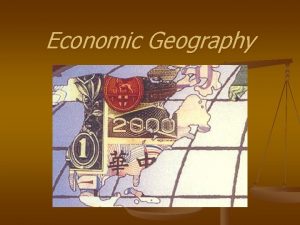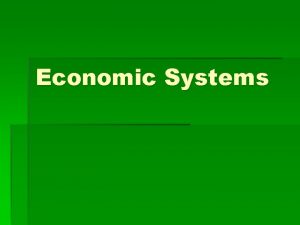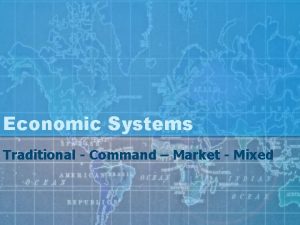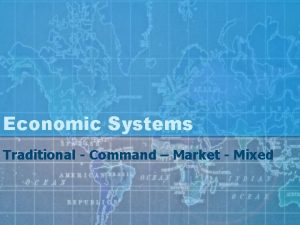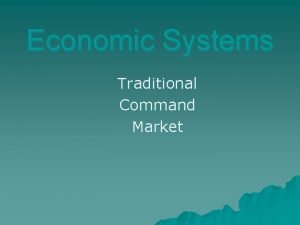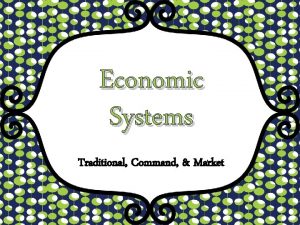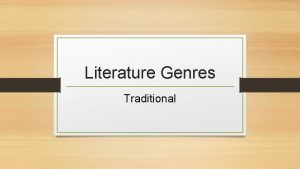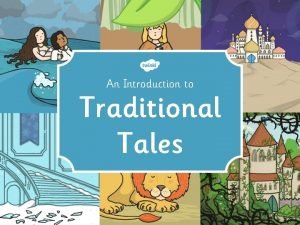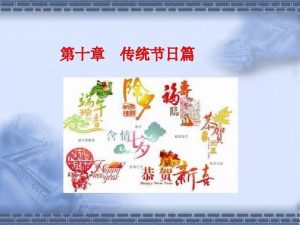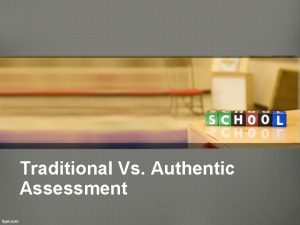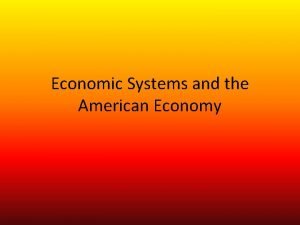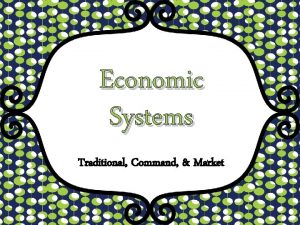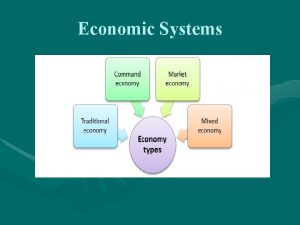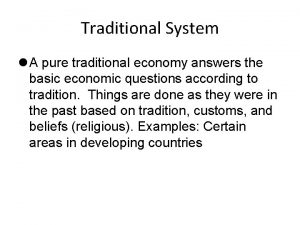Economic Systems 1 2 3 4 Traditional Economy





























- Slides: 29



Economic Systems • • 1. 2. 3. 4. Traditional Economy Free Market Economy Command (Centrally Planned)Economy Mixed Economy

An economic system is a method used by a society to produce and distribute goods and services.

Economic Systems. A society’s values, such as freedom or tradition, guide the type of economic system that society will have.

Three Economic Questions: 1 What goods and services should be produced? **Each society must decide what to produce in order to satisfy its needs and wants.

2. How should these goods and services be produced? **How to use a society's resources (combine land, labor and capital) to produce goods and services. Should a society produce electricity with oil, solar power or nuclear power?

Three Economic Questions 3. For whom should these goods and services be produced? **How do we divide the goods and services? Who gets to drive a Bentley and who gets a subway pass? This is determined by how societies distribute income.

Society's Goals and Values 1. Economic Efficiency Maximizing what you can get for resources 2. Economic Freedom Making economic choices 3. Economic Security/Prosperity Assuring goods and services will be there when needed

4. Economic Equity Who gets what resources? 5. Economic Growth/Innovation 6. Other: (depending on the economy) EX. Universal health care and environmental protection

1. Traditional Economy The oldest and simplest economic system. Rely on habit, custom, or ritual: family-based Members of these societies work to support the Entire community. Often lack modern conveniences and have a relatively Low standard of living. They meet their own needs.

Traditional Economy 1. con't What to produce? People follow their customs and traditions. 2. How to produce goods & services? People grow & make things the same way that their ancestors did based on customs and traditions 3. For Whom to produce? People in the village who need them.

2. Free Market Economy • An economic system in which production and distribution questions are answered by supply and demand Most of the resources are owned by private citizens Economic decisions based on Free Enterprise (competition between companies) Laissez-Faire: NO government interference at all !! No laws to protect workers form unfair bosses Pure Capitalism!!

self-interest: personal gain is the motivating force in the free market competition: regulating force INVISIBLE HAND (Adam Smith) incentives (negative and positive): A hope of reward or fear of punishment that encourages a person to behave a certain way (lower prices)


3. Command/Planned Economy Command—or —Centrally planned economies operate in direct opposition to free market economies.

Command/Planned Economy The government owns land capital, and controls labor (government decides where individuals work, how much they get paid) Forces that drive free market, like SELF-INTEREST and COMPETITION, are absent. Consumers don’t make decisions.


4. MIXED ECONOMY Mixed Economy: An economic system that features characteristics of both free market and command economic systems A mixed economic system allows a level of private economic freedom but also allows for govt's to interfere in economic activities in order to achieve social aims. Most modern economies mix both market and centrally planned systems. North Korea Japan New Zealand

MIXED ECONOMIES Balancing Control and Freedom Society must assess values and prioritize economic goals Some goals may be better met by the open market? Some goals must have government action? Each nation must decide what to give up in order to meet its goals


US MIXED ECONOMY In theory, it was believed that the U. S. market left to its own would provide the greatest benefit for consumers and raise the standard of living. (Laissez-Faire) However, government intervention became necessary because of the needs and wants of society. national defense, roads, education, mass transit worker safety and protection quality in production consumer goods governments create laws ▪ protect property rights? ? (patents, copyrights) ▪ anti-trust laws: Microsoft (prevent monopolies)

The United States Economy Government intervention for order, vital services and to promote the general welfare In the political continuum of conservatives vs. liberals Conservatives usually want less government intervention in the market place Liberals usually want the bigger/more government


1. Household: A person or group of people living in the same residence. 2. Firm: An organization that uses resources to produce a product which it then sells. 3. Profit: The financial gain made in a transaction

4. Factor Market: Market in which firms purchase the factors of production from households. 5. Product Market: The market in which households purchase the goods and services that firms produce.

Government in the Factor Market like businesses government purchases land, labor and capital from households in the factor market bureaucracy and military (2. 8 million employees, 9. 7 billion in wages)

Transferring Money government collects revenue (taxes) from both households and businesses revenue ($) is then transferred to a variety of services and products all of which need government employees to oversee ▪ Military, Food and Drug Administration, FDA needed? ▪ Biggest is social security? / $800 billion these days?

The United States Economy USA does have relatively few banking regulations (until now) and foreign Banks do have some restrictions Foreign investment in the USA is encouraged—where do you think the $800 billion came from to bail us out? ? ?
 Lesson 2 our economic choices
Lesson 2 our economic choices Athens vs sparta differences
Athens vs sparta differences Planned economy
Planned economy Traditional economy examples
Traditional economy examples Traditional economy definition economics
Traditional economy definition economics Traditional economy definition economics
Traditional economy definition economics Scarcity political cartoon
Scarcity political cartoon Traditional economy advantages
Traditional economy advantages Traditional economy advantages
Traditional economy advantages Advantages of mixed economy
Advantages of mixed economy Command economy pictures
Command economy pictures Traditional economy definition economics
Traditional economy definition economics Three types of economies
Three types of economies Traditional economy
Traditional economy 11:30
11:30 Are entrepreneurs encouraged in a traditional economy
Are entrepreneurs encouraged in a traditional economy Traditional economies meaning
Traditional economies meaning Why do we have economic systems
Why do we have economic systems Traditional economic system example
Traditional economic system example Traditional economic system example
Traditional economic system example Command economy example
Command economy example Economic growth vs economic development
Economic growth vs economic development Prof. meier and baldwin
Prof. meier and baldwin Traditional systems development
Traditional systems development Traditional approach in system analysis and design
Traditional approach in system analysis and design Traditional systems development life cycle
Traditional systems development life cycle Being resourceful meaning
Being resourceful meaning What economic system is germany
What economic system is germany Pure command system
Pure command system How many economic systems are there
How many economic systems are there
